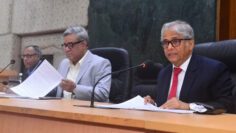UN resolution on Rohingyas carries political value: Momen
The United Nations (UN) has adopted the resolution on “The situation of human rights of Rohingya Muslims and other minorities in Myanmar” by consensus in New York on Wednesday.
“It’s a great day for us. We are very happy,” Dr Momen said, adding that it showed all countries want a peaceful solution to the Rohingya crisis.
“The countries those created obstacles (over the issue) earlier … like China, Russia… this time they didn’t create barrier, which means all want solution of the crisis,” he said.
The foreign minister said he had discussions with Russia over the issue while China has already made some interventions.
Dr Momen expressed his hope to see progress on resolving the Rohingya crisis at the UN Security Council (UNSC) as the resolution of UN General Assembly is not a mandatory one.
In June, Bangladesh had decided to abstain from an UN resolution on Myanmar as the Rohingya issue was not included.
“(That time), we said resolution will be meaningless if you don’t talk about the Rohingyas,” Dr Momen said regarding that resolution which highlighted restoration of democracy but no mention about return of Rohingyas.
The foreign minister said the forcibly displaced Rohingya people must go back to their country Myanmar for a better future.
“This resolution should now serve as an impetus for real actions in achieving a durable solution to the protracted Rohingya crisis through their safe and dignified return to their homeland in Myanmar”, said Bangladesh Permanent Representative at the UN Ambassador Rabab Fatima during the adoption of the resolution at the UN on Wednesday.
The resolution was jointly tabled by the member states of the Organization of Islamic Cooperation (OIC) and the European Union (EU).
A total of 107 countries co-sponsored the resolution, the highest since 2017.
Apart from the member states of EU and OIC, the resolution received significant cross-regional support, with co-sponsorship from the USA, Canada, Mexico, Argentina, Australia, New Zealand, Switzerland, Japan and Republic of
Korea, among others.
The primary focus of the resolution was the human rights situation of the Rohingya Muslims and other minorities in Myanmar, including in the context of the declaration of state of emergency on February 1, 2021.
It called upon Myanmar to address the root causes of the Rohingya crisis, fulfill its obligations under the bilateral agreements with Bangladesh, and cooperate fully with the special envoy of the Secretary General on Myanmar and all the human rights mechanisms of the UN, among others.
The resolution also maintained its strong focus on the ongoing justice and accountability processes.
It also welcomed the appointment of the new special envoy of the Secretary General on Myanmar and requested for a work plan for her engagements in Myanmar.
It also called for renewal and effective implementation of the MoU between Myanmar and UNHCR and UNDP in an effort to create conducive environment in the Rakhine State of Myanmar.
“The adoption of the Rohingya resolution, for the first time by consensus, demonstrates the international community’s strong resolve to end this crisis”, said Fatima.
In the resolution, the member states commended Bangladesh for its generosity in hosting the Rohingyas, and for providing humanitarian assistance to them and also for including them in the national COVID-19 vaccination drive.
The resolution also recognized the Bangladesh government’s efforts and investments in building the facilities in Bhashan Char for relocation of a portion of the Rohingyas from the congested camps, and in this regard, also welcomed the MoU signed by Bangladesh with UNHCR.
Since August 25 in 2017, Bangladesh is hosting over 1.1 million forcefully displaced Rohingyas in Cox’s Bazar district and most of them arrived there after a military crackdown by Myanmar, which the UN called a “textbook
example of ethnic cleansing” and other rights groups dubbed as “genocide”.
Myanmar, however, is yet to return a single Rohingya in the last four years while repatriation attempts failed twice due to trust deficit among the Rohingyas about their safety and security in Rakhine state.


















